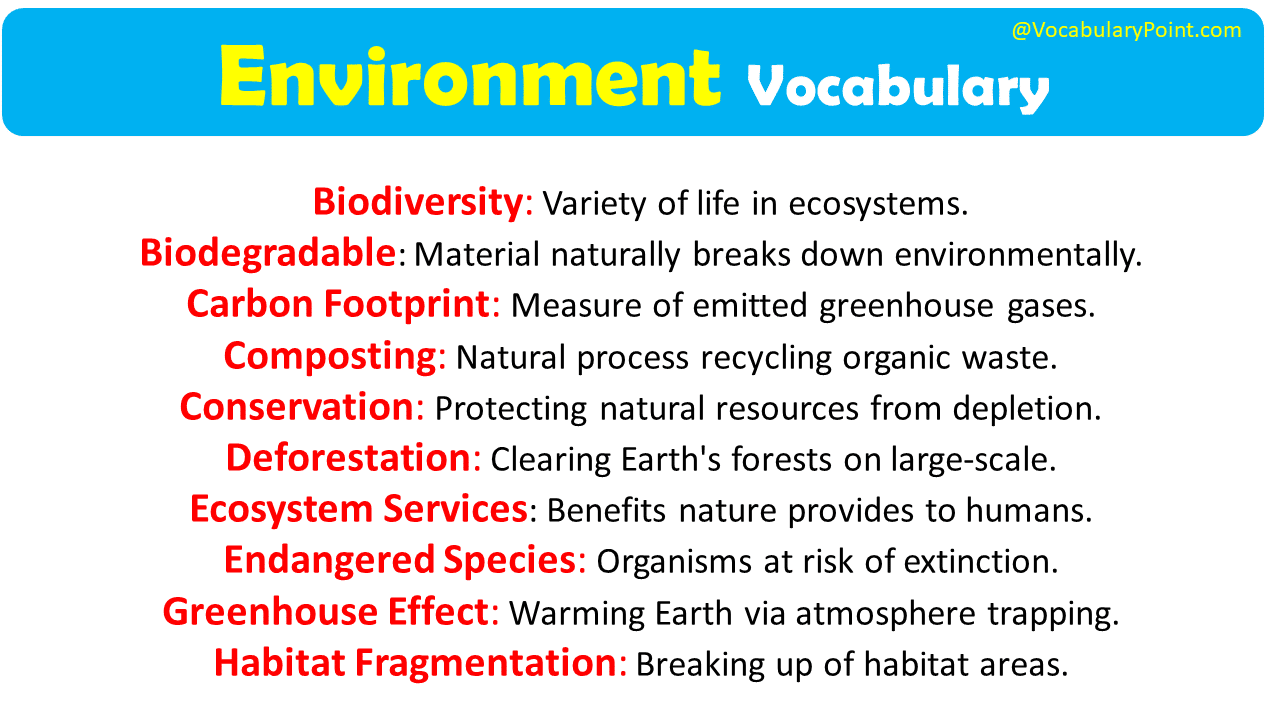As the world grapples with the escalating effects of climate change, deforestation, and pollution, a universal language is emerging—one that transcends borders and speaks to our shared responsibility for the planet. Welcome to the realm of environment vocabulary, where words like sustainability, biodiversity, and carbon footprint not only populate our conversations but also shape our understanding of the ecological challenges we face today.
Just as every ecosystem thrives on a delicate balance of interdependence, our dialogue about environmental issues hinges on a precise lexicon that empowers us to communicate effectively about safeguarding our future.
In this article, we’ll dive into the rich tapestry of terms that define the conversation surrounding environmental stewardship.
Environment Vocabulary
- Biodiversity: Variety of life in ecosystems.
- Biodegradable: Material naturally breaks down environmentally.
- Carbon Footprint: Measure of emitted greenhouse gases.
- Composting: Natural process recycling organic waste.
- Conservation: Protecting natural resources from depletion.
- Deforestation: Clearing Earth’s forests on large-scale.
- Ecosystem Services: Benefits nature provides to humans.
- Endangered Species: Organisms at risk of extinction.
- Greenhouse Effect: Warming Earth via atmosphere trapping.
- Habitat Fragmentation: Breaking up of habitat areas.
- Invasive Species: Non-native species causing harm.
- Keystone Species: Species crucial for ecosystem balance.
- Mitigation: Reducing severity of climate change.
- Organic: Produced without synthetic chemicals.
- Photosynthesis: Plants converting light to energy.
- Pollination: Transfer of pollen to fertilize.
- Renewable Energy: Energy from perpetual natural sources.
- Sustainability: Meeting needs without harming future.
- Urban Sprawl: Uncontrolled expansion of urban areas.
- Wetlands: Water-saturated land, diverse biomes.
- Xeriscaping: Landscaping needing minimal water usage.
- Zero Emission: No pollutants released while operating.
- Ecological Footprint: Impact of a person/community.
- Biocapacity: Environment’s capacity to generate resources.
- Anthropocene: Current era, significant human impact.
- Agroforestry: Integrating trees into agriculture.
- Albedo: Surface’s ability to reflect sunlight.
- Biomagnification: Toxins increasing in food chains.
- Chlorofluorocarbon (CFC): Compound causing ozone layer depletion.
- Decarbonization: Reducing carbon dioxide emissions.
Explore More Vocabulary:
(Nature and Environment, Musical, Medicine, Art)
Environmental Problems Vocabulary
- Air Pollution: Contaminants released into the atmosphere.
- Water Pollution: Harmful substances in water bodies.
- Soil Contamination: Soil polluted by hazardous chemicals.
- Ocean Acidification: Seawater becomes acidic, harming marine life.
- Deforestation: Forests cleared, ecosystems destroyed.
- Desertification: Fertile land becoming desert.
- Habitat Loss: Natural environments destroyed or altered.
- Overfishing: Fishing at unsustainable levels.
- Resource Depletion: Excessive use of natural resources.
- Waste Overflow: Excessive waste exceeds management capacity.
- Climate Change: Long-term shifts in temperatures, weather patterns.
- Global Warming: Earth’s average surface temperature increases.
- Ozone Layer Depletion: Thinning atmospheric layer, increased UV radiation.
- Urban Sprawl: Uncontrolled expansion of urban areas.
- Industrial Pollution: Pollutants from industrial activities.
- Noise Pollution: Excessive, harmful noise.
- Light Pollution: Excessive artificial light.
- E-waste: Discarded electronic appliances and devices.
- Invasive Species: Non-native species disrupt ecosystems.
- Pesticide Pollution: Harmful chemical pesticides in environment.
- Plastic Pollution: Accumulation of plastic objects.
- Acid Rain: Precipitation with acidic components.
- Greenhouse Gas Emissions: Gases trapping heat in atmosphere.
- Land Degradation: Deterioration of land’s productivity.
- Ecological Overshoot: Consuming resources faster than replenishment.
- Bioaccumulation: Accumulation of substances in organisms.
- Smog: Fog combined with smoke, pollutants.
- Thermal Pollution: Warming of ecosystems unnaturally.
- Algal Bloom: Excessive growth of algae.
- Biomagnification: Increase in concentration of toxins up the food chain.
